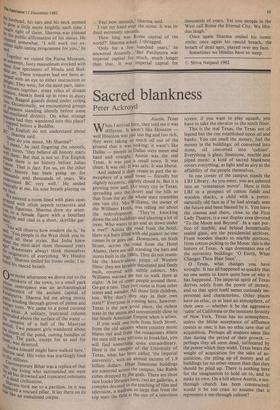Sacred blankness
Peter Ackroyd
Austin, Texas When I arrived here, they told me it was different. It wasn't like Houston — well Houston was just too big and too rich, ' they were taking so much oil out of the ground that it was sinking; it wasn't like Dallas — people in Dallas were mean and hard and straight. Austin was the real Texas. It was just a small town. It was clean. It was old. It was safe. It was liberal.
And indeed it does retain in part the at- mosphere of a small town — friendly but slightly eccentric, slightly closed in. But it is growing now and, like every city in Texas, spreading into the desert and the hills so that from the air the whole state resembles one vast city. Mrs Williams, the owner of the Williams Hotel, was telling me about the redevelopment. 'They're knocking down the old buildings and planting a lot of trees. Who wants to go and sit down under a tree?' Across the road from the hotel, there is a barn filled with old pianos: no one comes in or goes out. Downtown, on Sixth Street, across the road from the Hotel Alamo, there are still standing the bars and stores built in the 1880s. They do not resem- ble the knock-about props of Western films: they are lavishly decorated and finely built, covered with subtle colours. Mrs Williams warned rue not to walk there at night: 'A lot of street people around there. Go get a taxi. They Just come in from other states and wander. All those little children, too. Why don't they stay in their own state?' Everyone is coming here, however. Texas is the new good place, the richest state in the union and conveniently close to the South American Empire when it arises.
If you walk one mile from Sixth Street, from the old saloons where country music blares out and from the restaurants where the men still wear stetsons at breakfast, you will find something quite extraordinary. Here is the campus of the University of Texas, what has been called 'the imperial university', with an annual income of 1.9 billion dollars. Huge limestone buildings are scattered across the campus, like Rubik cubes dropped by the gods. There are three rare books libraries here, two art galleries, a complex devoted.to the teaching of film and television, a stadium. so large that from the Rip seats the field is the size of a television screen: if you want to play squash, you have to take the elevator to the ninth floor.
This is the real Texas, the Texas not of legend but the one established upon oil and banks. You can smell the money, feel the money in the buildings: oil converted into stone, oil converted into 'culture'. Everything is glass, limestone, marble and piped music: a kind of sacred blankness covers everything, as light and as airy as the affability of the people themselves.
In one corner of the campus stands the LBJ Library. As you enter, you are ushered into an 'orientation movie'. Here is little LBJ in a prospect of cotton fields and wooden shacks, a child with a preter- naturally old face as if he had already seen the future and been blasted by it. You leave the cinema and there, close to the First Lady Theatre, is a vast display area devoted `To the Moon and Beyond'. In a vast por- tico of marble, and behind hermetically sealed glass, are the presidential archives. From wooden shacks to marble porticos, from cotton-picking to the Moon: this is the history of Texas. A sign dominates one of the university buildings: '0 Earth, What Changes Thou Hast Seen'.
0 Texas, what changes you have wrought. It has all happened so quickly that no one seems to know quite how or why it has happened. The imperial spirit of Texas derives solely from the power of money, and so that spirit itself seems curiously im- personal and characterless. Other places have an ethic, or at least an atmosphere, of their own — whether it be the aggressive 'calm' of California or the innocent ferocity of New York. Texas has no atmosphere, unless the blithe acceptance of affluence counts as one; it has no ethic save that of acquisition. Perhaps all empires seem like that during the period of their growth — perhaps they all seem dead, suffocated by the power which they wield. Texas bears the weight of acquisition for the sake of ac- quisition, the piling up of money and of buildings for no other reason than that they should be piled up. There is nothing here for the imagination to hold on to, and to make its own. On a hill above Austin, a see- through church has been constructed; would it be too crass to assume that it represents a see-through culture?










































 Previous page
Previous page